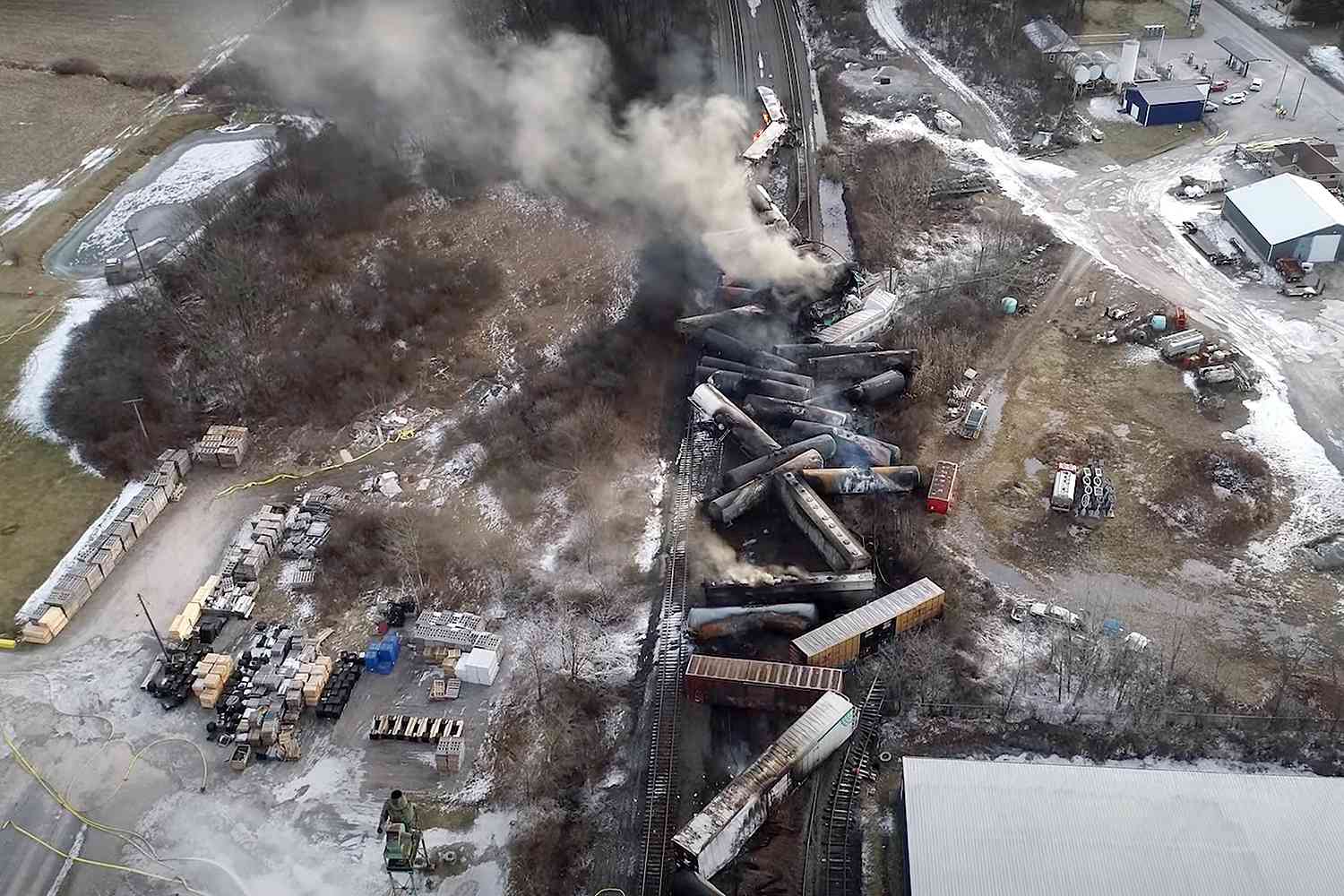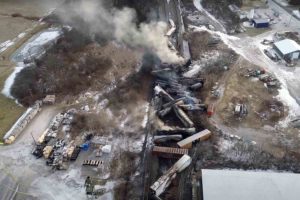
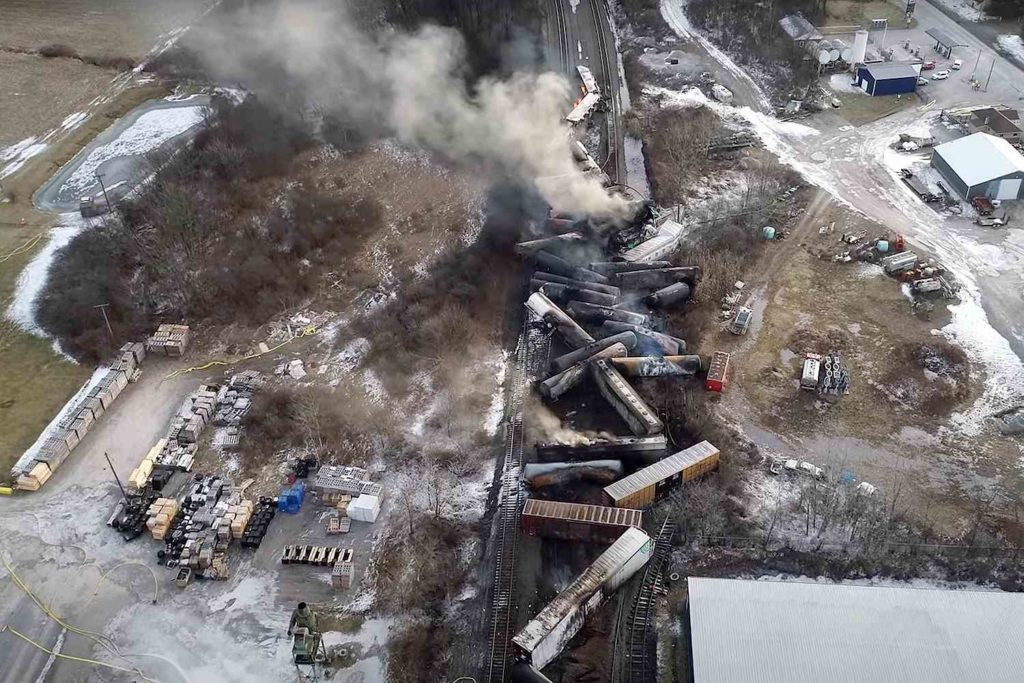
Written by: Hilary Flint
It’s been over two years since the East Palestine train derailment, and yet, every time another chemical disaster happens, I feel like I’m reliving it all over again. In the past few weeks alone, two major chemical incidents have struck Pennsylvania—an explosion at Parker Lord Corporation in Saegertown, near Erie, and a fire at SPS Technologies in Jenkintown, near Philadelphia. Each of these incidents, like East Palestine, serves as another devastating reminder of the risks posed by disaster-causing chemicals, not only to the environment, but to our health and safety.
I used to live in Enon Valley, Pennsylvania, a small town just over the Pennsylvania-Ohio border. When the Norfolk Southern train derailed in East Palestine on February 3, 2023, my family wasn’t in the official evacuation zone. But, toxins don’t stop at an imaginary line on a map. Norfolk Southern made the catastrophic decision to burn five tankers of vinyl chloride in a so-called “controlled release” which the NTSB questioned as even necessary, and which many would later see as the railroads profit-driven rush to get the train back up and running. At any rate, that decision changed everything for us.
We initially evacuated, then after being assured our home was safe, we returned. But within minutes of stepping inside, my eyes burned, my head pounded, and a strange, sweet chemical odor filled the air. Within days, my fingers and toes started turning purple. A few months later, my severe endometriosis, which had been suppressed for years with medication, suddenly flared up. My rheumatoid arthritis pain became unbearable. I had to increase my migraine medication twice.
I know now that vinyl chloride exposure can trigger Raynaud’s syndrome, the condition causing my fingers and toes to discolor. But back then, no one had guidance. No one told us how to protect ourselves from a chemical disaster of this magnitude. And still, to this day, residents in East Palestine, Beaver County, and beyond are left struggling to make sense of the long-term impacts.
Earlier this month, an explosion rocked the Parker Lord Plant in Saegertown, just outside Erie, injuring five Saegertown firefighters, one Edinboro firefighter, and seven LORD staff and forcing residents to shelter in place. The plant makes adhesives, coatings, and specialty materials used in the automotive, aerospace, industrial, and oil and gas industries.
Less than a week later, a massive fire broke out at SPS Technologies, an aerospace manufacturing facility, in Jenkintown, near Philadelphia, causing 60 employees to evacuate and prompting shelter-in-place orders. The fire luckily didn’t reach many of the hazardous chemicals stored on site. Pennsylvania DEP is continuing to monitor the area.
The full extent of chemical exposure from these two incidents remains unclear, but the immediate response from the government and Norfolk Southern has followed the same pattern as East Palestine: vague statements, insufficient testing, and the leaving in the dark of entire communities. The only certainty is that no one is safe as long as petrochemical infrastructure continues to operate.
According to the Oil and Gas Watch database, there are 233 petrochemical facilities operating in the United States. These facilities include infrastructure to transport, store, process, and refine petrochemicals from its raw oil and gas into more than 6000 products. Spilltracker, which tracks chemical disasters across the U.S., and reports that the U.S. averages one petrochemical incident every 3 days.
Each time a chemical disaster happens, the same questions emerge: What chemicals were released? Are residents safe? Do we need to evacuate? What are the long-term health risks? Too often, we don’t get real answers. Instead, we’re told, “Everything is fine.” But if there’s anything I’ve learned from my experience, it’s that “fine” is a lie.
So how do we protect ourselves when the systems meant to keep us safe keep failing?
How to Protect Yourself in a Chemical Disaster
If you find yourself in the midst of a chemical spill, fire, or explosion, it’s critical to act quickly. Here’s what you can do to protect yourself and your loved ones:
1. Stay Informed
- Keep your phone and backup batteries charged.
- Download emergency alert apps like FEMA’s and sign up for local emergency notifications.
- Follow reputable news sources and your county’s emergency management page for real-time updates.
- Keep numbers of who to call to report accidents or get answers from: local, state and national emergency management services.
2. Shelter in Place When Advised
- Close all windows, doors, and chimney vents tightly.
- Turn off HVAC systems and any outside air intakes.
- Use damp towels to seal door gaps if the air smells “off” or irritates your lungs.
- Do NOT rely on N95 masks alone—most chemical exposures require more protective respirators, like organic vapor cartridges.
- Follow boil water and do-not-drink water advisories.
3. Be Prepared for Evacuation
- Keep a “go bag” with essentials, including medications, masks, bottled water, and important documents.
- If you have a personal or family emergency preparedness plan, especially for sheltering in place, be sure you have enough drinking water, non-perishable food, and any necessary medical supplies for each member of your household, including service animals and pets.
- Know your evacuation routes ahead of time—many disasters happen in areas with limited road access.
- If you evacuate, document everything: take pictures, save air quality reports, and track symptoms in case you need to file claims later.
4. Monitor Your Health
- Pay attention to new or worsening symptoms like headaches, nausea, skin rashes, breathing issues, or neurological effects.
- If you seek medical care, insist on documentation that includes potential environmental exposure.
- Blood and urine tests for chemical exposure are often time-sensitive, so ask your doctor about testing options ASAP.
5. Demand Accessibility
- When the crisis has passed, local authorities will issue an all-clear announcement and provide any additional information or instructions for staying safe. Keep in mind that elected officials and corporations alike are often quick to declare an area “safe” without considering the diverse needs of its community members – including those who are disabled.
- Under the Americans with Disabilities Act (ADA), individuals with disabilities have the right to receive information in formats that are accessible to them. This includes emergency alerts, evacuation orders, and other critical communications that must be provided in formats such as large print and Braille, or through sign language interpreters, as necessary.
- The ADA and Section 504 of the Rehabilitation Act mandate that emergency shelters, medical services, and disaster recovery programs must be accessible to people with disabilities. This means shelters should accommodate mobility devices and service animals, and offer accessible transportation to those who need it.
6. Demand Accountability
- Ask local officials for transparent air, water, and soil testing data.
- Push for independent testing from non-governmental sources when possible.
- Get involved in community organizing efforts to advocate for stronger safety regulations and emergency response measures.
For a detailed preparation guide and list, check out this report from the People over Petro Coalition.
What happened in East Palestine should have been a wake-up call. Instead, the cycle continues—one disaster after another, with the same government failures and corporate cover-ups. But we are not just statistics in a report. We are living, breathing people whose health and futures are being sacrificed for profit.
If you take away anything from my story, let it be this: Do not wait for someone to tell you to protect yourself. Do your own research. Learn where there is active infrastructure, facilities, junkyards, and rail lines around you. Make your own safety plan. Trust your own body. Know that when disaster strikes, those in power will prioritize their bottom line. It’s up to us to prioritize each other.
Hilary Flint is the Director of Communications and Community Engagement for Beaver County Marcellus Awareness Community, PA Field Organizing Manager for Center for Oil and Gas Organizing, and a Mutual Aid + Disaster Response Steering Committee Member for Break Free From Plastic. Her expertise spans critical issues, including health harms generated by the petrochemical buildout, natural gas extraction, plastic pollution, railway safety, and overarching corporate greed. As a cancer survivor, chronic illness warrior, and community member affected by the East Palestine train derailment and chemical disaster, Hilary is committed to advocating through the lens of disability justice and supporting communities through mutual aid.

The holidays are a time to practice old traditions and start new traditions. This year, Clean Air Council is urging everyone to create the new tradition of a plastic-free holiday to be more mindful of the waste we create and our plastic usage. From Thanksgiving to New Years, Americans create 25% more waste. With simple and creative steps, we can all reduce this impact during the holiday season. And by avoiding plastics, you lower your exposure to toxic additives like lead and endocrine disruptors. The Council has compiled our favorite ideas for making the holidays more sustainable and plastic-free and we hope that you can put them to use as well as share them with your friends and family.
The Issue with Plastics
The holidays shine a spotlight on consumer behavior and consumption. We buy more, we eat more, and we generally use more “stuff.” Much of what we purchase is packaged in plastic or plastic itself. This plastic is creating a crisis for our health and the environment. From a health standpoint, environmental exposure to plastics and microplastics affects cardiovascular, renal, gastrointestinal, neurological, reproductive, and respiratory systems; impacts include cancers, diabetes, neuro-reproductive and developmental toxicity. Surprisingly, more than half of all plastic ever created was produced in the last 15 years. This plastic is derived from fossil fuels and fueling the climate crisis. While Clean Air Council is working hard to hold plastics producers like Shell accountable, it is also imperative that as a society we take meaningful steps to reduce our plastic consumption. This will not only reduce the toxic plastics problem, it will also help to safeguard our health and that of our loved ones. It is our hope that this guide will help us begin to break free from plastics with simple lifestyle changes around the holidays that lead into the rest of the year.
Spread Holiday Cheer Without Plastics This Year
Decorating
Creating a warm, bright, and cozy environment is a large part of the holidays. With simple steps, you can up your decorating game without relying on plastic. Take stock of what you already own. Go through your boxes of ornaments and decor instead of buying new decorations. Hold a decoration swap with friends and family to “spruce up” what you already own and give away what you are no longer using. Dried orange slices, cranberries, and popcorn are great natural materials for garland that you can hang around the house and on a Christmas tree. They can all be fed to birds after the tree comes down and the holidays are packed away. Oranges with cloves stuck in them look great in a bowl and will make your house smell delicious.
Christmas Tree
If you put up a Christmas tree, it can be hard to decide whether to use real or fake and which is better for the environment. The short answer is that real trees have a lighter impact. Nearly 90% of fake plastic trees are shipped from China. Real trees do not produce nearly the amount of carbon emissions that come from producing and shipping fake plastic trees. Real trees have the added benefit of creating a healthy forest habitat. Many trees in tree farms are left standing after the season and wildlife depend on them. Finally, real trees can be composted after the holiday is over as opposed to shedding microplastics and going to a landfill where most fake trees go after their use.
Gift Wrapping
In the US alone, an estimated 2.6 billion pounds of wrapping paper is thrown away each year, enough to cover 40 football fields. It’s easy to get creative and use reusable materials to create beautifully wrapped gifts. Paper shopping bags and newspapers can be repurposed as wrapping material and can be decorated with paint. In addition to paper bags and newspapers, tea towels and cloth bags are great for wrapping presents. Upcycle cloth ribbons from packaging that you gather throughout the year. If you don’t already have these materials, they are easily found at thrift stores.
Gift Giving
Clothing
Apparel is a common gift but most don’t realize its impact. Textiles are the largest source of primary microplastics (specifically manufactured to be smaller than 5mm), accounting for 34.8% of global microplastic pollution. These microplastics shed in the wash and enter our environment. Polyester and acrylic are the largest offenders. When choosing clothes to give, look for natural materials like cotton and wool. It’s also important to avoid “fast fashion” and buy from sustainable manufacturers or secondhand. Your local thrift and vintage stores are great for buying apparel. Secondhand clothing is also widely available online on websites such as Poshmark and Thred Up.
Toys
Plastic is ubiquitous when it comes to childrens’ toys. We all have memories of excitedly opening a new plastic toy during the holidays. However, not only can these toys contain dangerous toxins like lead, manufacturing them requires dirty petrochemicals. While purchasing an antique toy can seem like a smart solution, many older toys can contain lead. Look for toys made sustainably from natural materials like wood or cotton.
Zero Waste Gift Baskets
Get family and friends started on their zero-waste and plastic-free journeys by putting together a gift basket of helpful items. These can include beeswax wrappers, glass food containers, bars of shampoo and soap, cloth napkins, wool or hemp dryer balls, and stainless steel water bottles. Many of these items can be found in small local stores so you can avoid shipping and packaging.
Clean Air Council Staff Advice
To help celebrate a plastic-free holiday, Clean Air Council’s staff has the following advice:
“I always like the ‘give experiences instead of gifts’ advice, like buying a gift card at a massage place, paying for a snowboard lesson, etc. Gifting homemade food is always good too.” Andrew Woomer, Advocacy Coordinator and Project Manager
“A gift card or a trip to their local bulk goods / refill store! I really like Good Buy Supply on East Passyunk for my laundry detergent.” Alice Lu, Policy Coordinator
“Wrap gifts in fabric, cloth, or hand towels. Thrift stores are perfect for these finds.” Eleanor Breslin, Staff Attorney
“For the more crafty gifter, you can buy a 100% wool sweater at goodwill, unravel it and make your own wool balls. It’s a little time intensive but it’s very affordable and handmade.” Corinne Bishop, Administrator
“For decorations, I like natural items like dehydrated orange slices (on a string for a garland), plant garlands, pine cones on decorative plates or platters, candles, and Christmas flowers (poinsettia, amaryllis, hyacinth). Eucalyptus and any kind of conifers are great for wreaths and other arrangements.” Sanna Kyynäräinen, Project Coordinator
Happy Holidays,
Clean Air Council
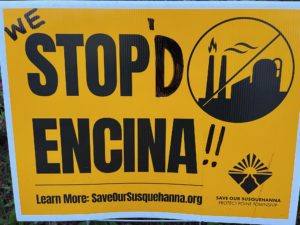
The Texas-based corporation Encina announced on April 18, 2024 that it was withdrawing its plan to develop a toxic plastics chemical recycling plant along the banks of the Susquehanna River in Point Township, Northumberland County.
The facility would have been the largest of its kind in the United States and intended to use extreme heat pyrolysis and refining processes to turn post-consumer plastic waste into benzene, a known carcinogen, xylene, and toluene. These chemicals were then to be shipped by rail, raising major air quality and safety concerns. The facility, proposed to be built in a floodplain along the West branch of the Susquehanna River, would have withdrawn 2.9 million gallons of water from the river per day, raising huge concerns about PFAS, microplastics, and other sources of contamination to a vital source of drinking water.
Encina’s permitting process was plagued with denials and deficiency letters. In March 2023, the Point Township Zoning Board unanimously rejected Encina’s application for a variance to build the facility above the height allowed for the site. In October 2023, Encina withdrew its application for a National Pollutant Discharge Elimination System (NPDES) permit after receiving a second technical deficiency letter. Community opposition culminated on April 2, 2024, when Northumberland Borough Council, which is the neighboring municipality, unanimously passed a resolution opposing the Encina facility.
Community opposition arose immediately after the facility was first announced in 2022. Residents came together to form the group, Save Our Susquehanna (SOS). Community members met with their local officials, attended municipal and county council meetings, canvassed their neighbors, and wrote letters to the editor to the local newspaper. The Council worked with SOS members to review permit applications and flag deficiencies for regulatory departments.
In a tremendous display of community power, Northumberland County residents have shown that the chemical recycling and plastics industries are not welcome in Pennsylvania. However, the fight isn’t over. Encina has been defeated, but it was part of a rapid expansion of pyrolysis and “advanced recycling” facilities that are part of a larger industry-led greenwashing effort to rebrand plastic as sustainable. This is unproven technology: many existing facilities are not economically viable and have been plagued by environmental and safety disasters. Yet we know the industry will keep trying to bring these false solutions to our communities. The Council will continue working with the community group Save our Susquehanna to monitor potential developments and to envision alternatives for a truly sustainable future.

NORTHUMBERLAND COUNTY (April 18, 2024) – After years of community and legal advocacy, the residents of Northumberland County can breathe a clean sigh of relief.
Today, the Texas-based Encina corporation announced that it is withdrawing its plan to develop a toxic plastics chemical recycling plant along the banks of the Susquehanna River in Point Township, Northumberland County.
The now-dead plastic chemical recycling plant faced immediate community opposition when it was announced in 2022. The proposed facility—which would have been the largest of its kind in the United States—intended to use extreme heat and refining processes to convert plastic into toxic benzene, toluene, and xylene to be shipped by rail throughout the state, raising major air quality and safety concerns. The process would have used 2.9 million gallons of water a day from the Susquehanna River, threatening to pollute a vital source of drinking water with microplastics and PFAS.
“This is a huge win for the residents of Northumberland County, for the six million people who use the Susquehanna for drinking water, and for all Pennsylvanians who have a constitutional right to clean air,” said Alex Bomstein, Executive Director of Clean Air Council, which has been supporting residents and applying legal scrutiny on the project. “Chemical recycling is not a solution to the plastics crisis. Encina sold false promises to our state, and this must be a wake-up call to elected officials that toxic boondoggles like chemical recycling have no place in Pennsylvania.”
“This project threatened the region’s clean air and water and would have harmed our way of life in the area, especially for the people who live next to the proposed facility,” said Sandy Field, member of the local residents group Save Our Susquehanna. “Community members stood up and spoke out about these unacceptable risks, and Save our Susquehanna is thrilled that Encina will not be building their toxic chemical plant in our area. But we do not wish this plant on others, and we will continue to warn other communities about chemical recycling and the danger it poses to communities.”
“This community is safer without Encina’s proposed chemical recycling plant looming in the floodplains. Chemical recycling isn’t a solution to plastic waste, but rather a transformation of plastic waste like a bottle in the river, into toxic air, soil and water pollution for the community,” said Jess Conard, Appalachia Director at Beyond Plastics. “Encina’s departure is a welcomed relief for everyone, and it has been an honor to work alongside the Save Our Susquehanna team.”
The death of this project follows the closure of a similar chemical recycling facility in Oregon, and major issues at other facilities in Ohio, Indiana, and North Carolina. Despite the industry’s poor track and lack of technical and economic viability, more chemical recycling facilities are proposed and the industry has successfully lobbied state governments, including Pennsylvania, to avoid regulations intended to protect residents.
“The significance of this win cannot be overstated,” said Bomstein. “But the fight is not over. Toxic chemical recycling is a false solution to the plastics crisis. It doesn’t belong in Point Township. It doesn’t belong in Pennsylvania. And it doesn’t belong in any other community.”
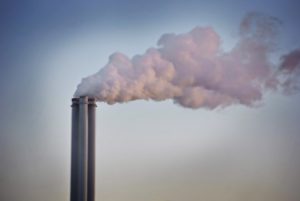
NORTHUMBERLAND COUNTY, PA (October 20, 2023) – This week, Texas-based Encina withdrew a critical application for a permit that it needs to build a plastic waste processing facility in Point Township, Northumberland County. The facility, which Encina wants to site on the banks of the Susquehanna River, would use an energy-intensive process called pyrolysis to break down 450,000 tons of plastic waste each year into chemicals such as benzene, toluene, propylene, and xylene—some of which are carcinogenic—as well as residual toxic waste. Encina has not disclosed details about its unproven pyrolysis process, but it is poised to be a major source of harmful pollution for surrounding communities.
Before Encina begins construction, it must receive a National Pollutant Discharge Elimination System (NPDES) permit for discharges of stormwater to prevent construction runoff from polluting the Susquehanna River. This week, Encina withdrew its permit application after an 11-month review from the Pennsylvania Department of Environmental Protection (DEP) found that Encina’s application contained over a dozen major deficiencies and used “wholly inadequate” design and modeling approaches. This permit withdrawal represents a major setback to Encina, which must now redesign its construction plans and restart the permitting process.
“Encina’s proposed facility uses unproven, undisclosed plastics technology that will produce carcinogenic and highly flammable chemicals. The fact that Encina has proven unable to comply with basic permitting requirements is a tremendous red flag for this project,” said Joseph Otis Minott, Clean Air Council’s Executive Director and Chief Counsel. “Local and state governments must continue to scrutinize Encina’s permit applications to protect residents and the environment from the dangerous impacts of this project.”
This permit withdrawal follows a long series of setbacks to Encina’s proposed facility. This summer, DEP denied the Act 537 sewage facilities plan amendment required for this project’s wastewater treatment system. And in March 2023, the Point Township Zoning Board denied Encina’s request for a zoning variance to exceed height limitations after hearing comments from local residents.
“This is just another example of one of our major concerns,” said Sandy Field, member of Save our Susquehanna. “They don’t seem to know what they’re doing. When members of our community ask technical questions about the process, they say it’s proprietary or give evasive non-answers. Now it seems that DEP also wants details that Encina can’t provide and this is just for the permit to handle stormwater during construction. The way they seem to overreach with no technical expertise is very concerning to us. It seems like they’re just winging it.”
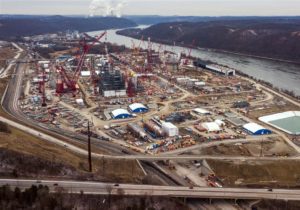
Pittsburgh, PA — A pair of environmental organizations today sent a letter to Pennsylvania urging the state to temporarily halt operations at a Shell plastics chemical plant northwest of Pittsburgh that has repeatedly violated air pollution limits and recently released plumes of black smoke for several hours.
Clean Air Council and the Environmental Integrity Project asked the Pennsylvania Department of Environmental Protection to temporarily halt operations of the Shell Polymers Monaca plant in Beaver County until the company can demonstrate it can operate in compliance with pollution control laws.
The two groups also today filed a notice of intent to sue Shell for violating the chemical plant’s 12-month permit limit on nitrogen oxides (NOx), which contribute to asthma attacks, lung disease, and (in the environment) smog and acid rain. This is the second notice from the groups in three weeks: On February 2, the organizations sent a notice to Shell for other violations of the plant’s air permit, including a 12-month limit on volatile organic compounds (VOCs), which also contribute to smog and health problems, and a prohibition on certain “visible emissions,” including black smoke from flares.
Under the federal Clean Air Act, plaintiffs must send notices of intent to sue at least 60 days before filing a complaint in federal court.
“DEP must act quickly to stop Shell’s ongoing violations of pollution limits that are meant to protect public health” said Sarah Kula, attorney for the Environmental Integrity Project. “Since the plant has come online, Shell has struggled to meet its permit limits, and DEP needs to order a pause to operations until Shell can comply with the law.”
“We will continue to hold Shell accountable as long as they continue to violate the law,” said Joseph Minott, Clean Air Council Executive Director and Chief Counsel. “The health and environmental risks that come with pollution exceedances can harm communities and the region for generations to come. DEP must put the plant on hold until Shell can get its act together.”
On Monday, the Shell plant’s flare released large amounts of black smoke over the course of several hours. BreatheCam.org footage of the February 13th event can be found here. Plants often use these flaring events to burn off chemicals rather than vent directly into the atmosphere, but Shell’s permit does not allow the kind of visible emissions that occurred on Monday. When a flare is not operating properly, it can release dangerous air pollution, including fine particulate matter, benzene, hexane, formaldehyde, mercury, arsenic, and other organic hazardous air pollutants.
In 2022, Shell emitted 346 tons of NOx, which exceeded its permitted annual NOx emissions (328.8 tons of NOx in a 12-month period). From August to December 2022 alone, the plant emitted 310 tons of NOx – nearly reaching the 12-month limit during this five month period.
For a copy of the letter to the Pennsylvania Department of Environmental Protection, click here. For the most recent notice of intent to sue with exhibits, click here.

Monaca, PA (December 15, 2022) – Last night, The Pennsylvania Department of Environmental Protection (DEP) issued a notice of violation to Shell Chemical Appalachia for exceeding their rolling yearly volatile organic compounds (VOCs) limit by nearly 150 tons at their Beaver County Ethane Cracking facility. This facility emitted a total of 662.9 tons of VOCs, and is the largest VOC emitter in Beaver County. This happened immediately after a fraught startup by the facility including excessive flaring and a sickly sweet maple syrup-like odor from VOCs being released into the community.
“These pollution limits are based on worst case scenarios by the facility,” said Joseph Minott, Executive Director and Chief Counsel of Clean Air Council. “To exceed this kind of limit in such an excessive fashion is unacceptable and unprecedented in Pennsylvania and puts nearby communities in serious danger.”
VOCs are a class of harmful air pollutants that can cause eye, nose, and throat irritation; headaches and loss of coordination; nausea; and damage to the liver, kidneys, or central nervous system. In addition to health effects, they contribute to the formation of ground level ozone or smog. It appears that most of the 100 tons of excess emissions were released in one month from September to October during a period that residents have reported heavy flaring from the facility. DEP has confirmed that other emissions of harmful pollutants have increased along with VOC emissions but have not yet been exceeded.
“Clean Air Council entered into a settlement agreement with Shell in order to stop excessive VOC emissions from flares and install a fenceline monitoring system,” said Alex Bomstein, Legal Director at Clean Air Council. “DEP must now take further action and enforce the law.”
“These limits are meant to protect frontline communities from toxic pollution from the plant,” said Sarah Kula, Attorney at the Environmental Integrity Project. “The state’s notice of violation is an important step, but Pennsylvania needs to follow through to ensure these violations don’t happen again.”
